Beth Kephart's Blog, page 154
November 20, 2012
I watch "The Voice," and I love Cee Lo Green (and Blake Shelton)
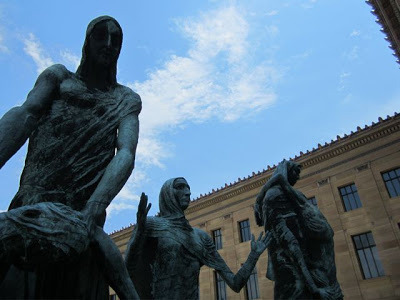
It's as simple as that.
Because the man sits on the edge of his funny-looking chair and, with absorbing intensity, with a giant, declarative heart, believes in those who are singing.
Because when they do what he claims he cannot do as a performer, when they hit notes that he says are beyond him, when they have what he calls a God-given talent, he is genuine and never envious in his appreciation. He speaks with awe.
Because when they move him, he tells them why, he tells them how.
Because how often do we get to see mentors who step aside to make room for others, coaches who do not boast of their own influence, artists who believe there will always be more room for artists and who do not fear talent greater than their own?
Arrogance is insulating. Selfishness is a form of rot. Cee Lo Green (and Blake Shelton, too) step aside to make room for others. When they do, we see how large they are.




Published on November 20, 2012 06:06
November 19, 2012
Ask the Passengers/A.S. King: Reflections
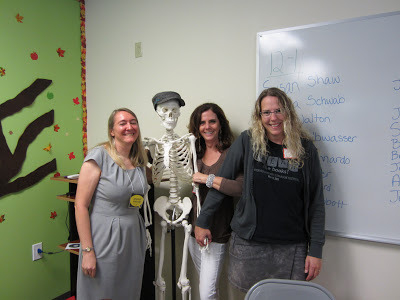
When I read the books of writer-friends, I read differently. This can't be helped. The book isn't my friend, and my friend isn't the book—but. I can hear her in the pages. I can somehow see beyond the pages. My writer friend has told writer stories—how she changed the end, how she wasn't positive, how she's her own gnarly radiator of love (okay, truth: I called her the gnarly radiator of love)—and these writer-at-work stories are embedded, their traces can be found. The making is at one with the made.
And yet.
The best books are always more than. This is abundantly true of A.S. King and her newest novel, Ask the Passengers. Astrid Jones, the novel's teen star, lives in a gossip town among They said-ers, in a household so simultaneously rigid and lax that it may just be falling apart. Astrid could very possibly and positively be in love, but she's not sure. Well maybe Astrid is sure, about the love part, but she doesn't know what loving another girl means. Does it define her? Box her? Label her? Does it make her worthy of a gossip town's gossip? Can Socrates and his paradoxes save her? Can her own love, sent out into the universe, be boomeranged right back? And can a bunch of bronzed, skinny cheerleaders spell the word TOLERANCE?
That's Ask the Passengers, in a paragraph. But it's also not. Because the reason this book has so many stars and so many people talking is that it all goes deeper than that. King has allowed herself to love her characters; she has also (fiercely) relinquished them, which is to say she has not hidden their faults, lies, worst hours. She has refused to judge them, or to sell them short, or to make them one-dimensional for the sake of plot. She hasn't written a gimmick of a book. She hasn't merely shown us how deep her talent runs.
Instead, A.S. King has set out to remind us of important things about how we treat both the world and ourselves. Which is to say that she has given deeply of her truest and most radiating, radiant she-self.




Published on November 19, 2012 05:37
November 18, 2012
Goblin Secrets/William Alexander: Reflections

I am not by nature a reader of fantasy or steampunk. Perhaps it's because my childhood was spent studying picture books with titles such as We Help Daddy and Are You My Mother? that I grew up all Seriousness and Responsibility, less than funny, and (oh, the curse) unimaginatively thoughtful. What can I do to help my daddy, and are you, in fact, my mother? Such were the profound mental exhilarations of my childhood.
But I digress (and exaggerate).
Yesterday I placed my many inadequacies aside and brought home William Alexander's Goblin Secrets, winner of this year's National Book Awards. I knew absolutely nothing about the story except for what the great Gary D. Schmidt said about it during and just after the awards ceremony. My thinking was this: If Gary D. Schmidt loves this book, Beth Kephart better give it a whirl.
Beth Kephart's happy that she did. Lacking the vocabulary to offer a precise critique, she'll just say this: the world Alexander creates—of creaking gears and angry pigeons, traveling caravans and glass clocks, brave boys and forgiving goblins—is engrossing, palpable, nearly Venetian as it limns its masquerade. The characters are heart-string-tuggers. There's a river here that doesn't just flow but talks. There are coming floods. There are anticipated disasters. These are kids who take it upon themselves to rescue sinking cities.
Which is all so absolutely apropos in the wake of the storms, rivers, seas that threaten to undo us.




Published on November 18, 2012 07:45
Code Name Verity/Elizabeth Wein: Reflections

Code Name Verity, a story about World War II, aviation, spying and the fierce loveliness of two best friends, will go down as one of this year's Big Young Adult Books. The earliest reviews, insistent and fervent, made this clear. "Fiendishly plotted," "unforgettable and wrenching," "heart-in-your-mouth adventure"—this book, agreed its readers, has it all.
While I had had my copy for quite some time, it wasn't until this weekend that I could sit and read. Any author who commits to bringing history to life is going to catch my eye. Any writer who recognizes that writing for teens is an opportunity to go wide, wild, and big has my favor. Wein, a pilot herself and a folklorist, holds nothing back in this complex saga about a bigger-than-life, multiply code-named Scot who buys herself time in a Nazi torture chamber by confessing (Sheherazade style) the story of her resistance. She's going to tell it all—every last detail. She's going to charm her captors with the many adventures that have brought her here, to Nazi-occupied France, in the seeming-last weeks of her life. Her tales are riddled with code—with place names, airplane names, revelations. They're profoundly and perplexingly particular. But mostly they're about the confessor's best friend, the pilot Maddie, and the many tangled lines of the two girl's adventures, the calculations and miscalculations that led straight to the torture chamber.
The Gestapo setting is grim. The torture is palpable. Planes will crash. Toes and fingers will vanish. Somehow, however, the story—pluckish and adventurous, daring and bold—never moves at anything less than an upbeat tempo. Even at the worst of times, Wein's characters are clever—infused with knowing, delightfully devious, so quick witted that I wanted to write "devilishly" quick witted, but no. These girls aren't devilish at all. These girls understand that the second best thing to do in the face of terror is to be bold. The first best thing is to remain utterly true to your very dearest friend, even if truth, which is to say verity, means contemplating the ultimate sacrifice.




Published on November 18, 2012 07:20
November 17, 2012
what I'm reading now

I woke at 4 this morning and had a choice to make: with my corporate work suspended until Monday at 8 AM, how would I spend this sudden gust of unscheduled time?
Reading?
Writing?
I mean, let's face it: I left my own Florentine novel in suspense at page 80—I left it, literally, mid-sentence, in a scene I never saw coming. I left it several days ago, feels like weeks ago, feels like another era, and I don't know when I will get to it again. I don't know if I'll remember what it was I imagined I was doing.
But. There are four books I've been dying to read—four books that, if left unread, basically disqualify me to opine about the year in Children's/YA. And I gotta opine.
Picture me reading this weekend, then, in the following order:
Code Name Verity (Elizabeth Wein)
Son (Lois Lowry)
Ask the Passengers (A.S. King)
Goblin Secrets (William Alexander)
My thoughts about Code Name Verity will be posted here tomorrow.




Published on November 17, 2012 07:34
November 16, 2012
maybe fame is, after all is said and done, boring

This is the tree that lives just outside my window, and this is yesterday. I've done nothing to amplify or affect the color of the leaves. They are just like this, for now.
Sometimes I think about how my life could be bigger, my reach broader, my impact more lasting. Sometimes I wish. Sometimes I measure myself against impossible standards, or against something somebody said. And then the light will change, and I'm reminded of how empty and meaningless that kind of questing is.
Today that light was these words about fame from Jack Gilbert, quoted in the New York Times obituary written by Bruce Weber.
In 1962, Mr. Gilbert was a poetry star. He had won the Yale prize, and
the editor Gordon Lish had devoted an entire issue of the literary
journal Genesis West to him. Theodore Roethke, Stephen Spender and
Stanley Kunitz praised him in print. He was in demand as a reader. But
it didn’t take.
“I enjoyed those six months of being famous,” he recalled in the Paris
Review interview. “Fame is a lot of fun, but it’s not interesting. I
loved being noticed and praised, even the banquets. But they didn’t have
anything that I wanted. After about six months, I found it boring.
There were so many things to do, to live. I didn’t want to be praised
all the time — I liked the idea, but I didn’t invest much in it.”




Published on November 16, 2012 13:49
A.S. King comes to town; we celebrate her love
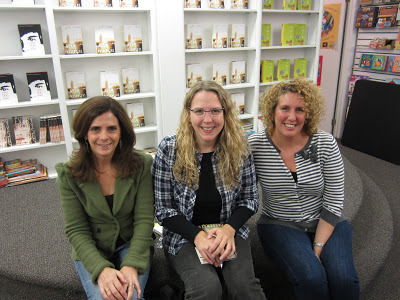
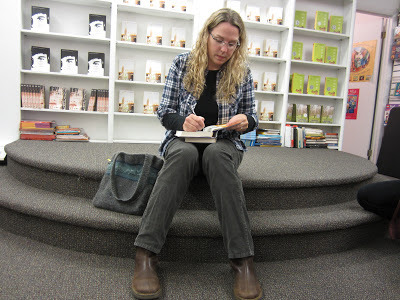
Last night, at Children's Book World in Haverford, PA, A.S. King blew in through the back door (or perhaps she bobbled slightly) and that was it: we were already in stitches. Kate Walton and I had already arrived, claiming first-in-line privileges at this Ask the Passengers signing. We'd been hearing all the good things—the many starry, best of things—about this newest King novel, and we were eager.
A.S. had been warned not to make me laugh (think of the damage to my gum graft stitches, I implored her), but she's unstoppable. She roved, incautiously, from venison to rad eyeball wear to root canals to Rohm and Haas photography (yes, A.S. and I were working for this chemical giant at the same time, bizarrely) to chocolate pretzels (they're part of the root canal story) to streetwalkers to Poe to roach motels to wrecking balls to her electrical engineering talents to unventilated dark rooms—and the night hadn't even started. She broke her don't-be-funny promise several times. She read from Ask the Passengers and her forthcoming Reality Boy, and it was good.
But what was also good, or riveted to the good, was the feeling at Children's Book World, one of the best stores anywhere. Kelly Simmons and Jenn Hubbard were also in the house. The tried and true CBW entourage. We had plenty of time just to sit and appreciate a writer who writes (in her gnarly radiating, radioactive ways) about love.
Now to clear away the corporate maelstrom that has had me down and out for weeks and find some time to read.




Published on November 16, 2012 06:11
November 15, 2012
My husband's art goes 3D
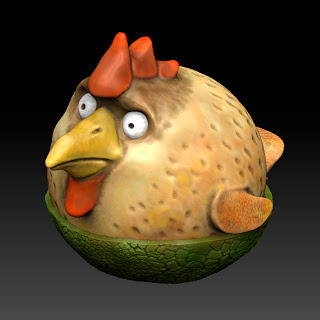
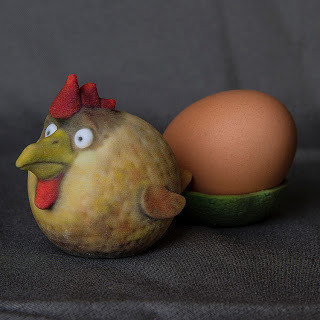
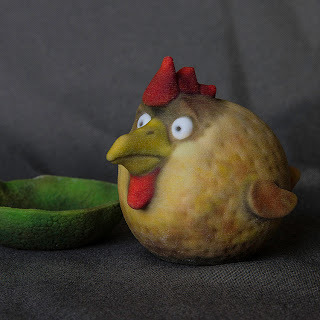
From time to time I energize this little lit blog with images crafted by my husband. It makes me happy. His work is good.
I have, for example, provided a reveal of Dr. Radway's Sarsaparilla Resolvent, my 1871 Philadelphia book (forthcoming in March) for which my husband both provided a dozen interior illustrations and the wonderful cover art.
I have showcased sample spreads from Zenobia: The Curious Book of Business, the corporate fable on which we collaborated with Matthew Emmens; this Alice in Wonderlandish exercise in strangeness and delight sold to a dozen countries worldwide.
I have offered my thoughts on Ghosts in the Garden, the coming-into-middle-age Chanticleer garden book my husband brought to life with black-and-white photographs.
I have shared those stunning photographs of ballroom friends, transported into and transfigured by imaginary spaces (fun fact: two of those stunning dancers are now appearing in the new Bradley Cooper movie, "The Silver Lining Handbook," based on the novel by Matthew Quick).
Then there was the fabulous William Sulit art that accompanied my review of Tina Fey's Bossypants.
Today I'm posting new work by Bill—a three-dimensional model that he created with ZBrush modeling software (the first image above is the illustration) before sending that art to Shapeways, a manufacturer capable of converting illustrations into three-D sculpture in a variety of materials (the second and third images depict the cute and surprisingly weighty sculpture that arrived by post yesterday—it's a few inches high by a few inches wide; it feels like pottery in your hand; the egg is pure photo prop and will be my breakfast tomorrow). For reasons known only to him, Bill decided to produce a chicken; I hope he wasn't inspired by my reaction to recent gum graft surgery. We're thinking these sculptures—which can be erupt from anything Bill decides to draw and 3-dimensionalize—are potential rich.
If you want to know more, just ask me (and then I'll ask him). In the meantime, he's back in that studio fortress of his, developing images for my upcoming keynote address at the Publishing Perspectives conference. I am hoping there will be no chickens.




Published on November 15, 2012 08:04
November 14, 2012
Remembering the great poet Jack Gilbert
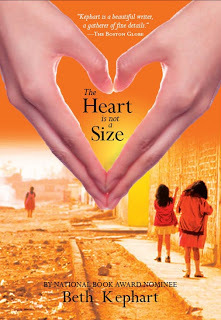
It is with such a heavy heart that I learned today of the passing of Jack Gilbert, a man whose words made me feel infinitely alive. Tangled, declarative, beastly, gentle, raging, wanting—Gilbert's poems were everything. I would teach them to the boy who would come to my house seeking solace and proof that the world was worth surviving. I would read them to myself. They sit before me now, across the room, the Jack Gilbert poems.
I wrote Jack Gilbert into The Heart is Not a Size, my fourth novel for young adults. In the novel, I send my Georgia into Juarez, Mexico, with her best friend Riley. Georgia is anxious, trying to prove courage to herself, trying to find it. Just before Georgia leaves for this life-changing trip she remembers learning a Jack Gilbert poem in sophomore year and is steadied by the memory.
Later that night I woke up sweating
from a dream, those black wings inside my ribcage beating, my mother’s words, Apply your intelligence to every living
thing, snaking through my blood.
Because again my heart knew what my mind had avoided: Juarez was probably a hare-brained
scheme; what were the chances—really—that I’d fly all the way there and come home
stronger? I fought with the dark
to free myself from my bed, struggled to wrest the weight from my chest. It was after two, and the house was
quiet, and I headed for the stairs, my right fist against my heart to quiet the
fury, to survive it. I needed the
night beyond, which finally I reached, stumbling out onto the porch and into
the streets and heading for the fairgrounds, which were empty now, the horses
long since talked back into their trailers and driven off, Riley’s stories
floating somewhere in the caverns of their heads. I hadn’t had a panic attack in two months. Each one was bigger than the last.
We find the heart only by dismantling
what/the heart knows. The
words are from a poem Jack Gilbert wrote and Mr. Buzzby read toward the end of
my sophomore year, when I finally stopped minding the class so much and settled
in to learn. I walked the streets last night with that line in my
head—walked until I could breathe again and stand up straight without
collapsing. I was going to Juarez
because I needed some perspective, some place where I could let the big bird
free. My head knew things that my
heart didn’t yet. I was
privileged. I was smart. I had a future. It was time to believe in myself.
Peace, Jack Gilbert.




Published on November 14, 2012 04:36
November 13, 2012
I'll be keynoting at the Publishing Perspectives YA: What's Next Conference
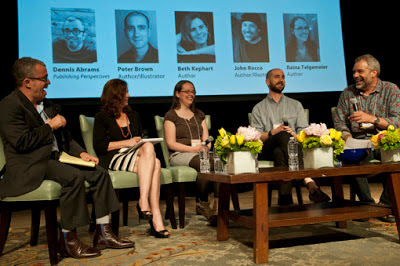
I'll keep this short, because it's one of those days, and because sometimes the headline is the story.
Ed Nawotka, editor-in-chief of Publishing Perspectives, has just shared the news that I'll be delivering the keynote address at the upcoming Publishing Perspectives conference. The date is November 28. The hour is 9 AM. The place is the Scholastic headquarters, which recently hosted Taylor Swift, among other greats. The attire is whatever I choose to wear and whichever pair of shoes I feel can walk me through Manhattan at that hour.
I will also be moderating a panel.
I've written about this well-orchestrated event at other times, most recently here. I am hopeful that those of you who are interested in the future of children's literature and who want to hear from industry leaders such as Aimee Friedman (Scholastic Trade), Dan Weiss (St. Martin's Press), Mara Anastas (Pulse/Simon & Schuster), Stacy Lellos (Scholastic Trade), Andrew Losowsky (Huffington Post), Jennifer Brown (Shelf Awareness), Doris Janhsen (Oetinger, Germany), Larissa Faw (Your Markets Alert), Francine Lucidon (The Voracious Reader Bookstore), David Levithan (Scholastic/Author), Eliot Schrefer (NBA nominated author), and others will attend. It will be, I promise, a good time.
More information here.
[image error]




Published on November 13, 2012 13:17



